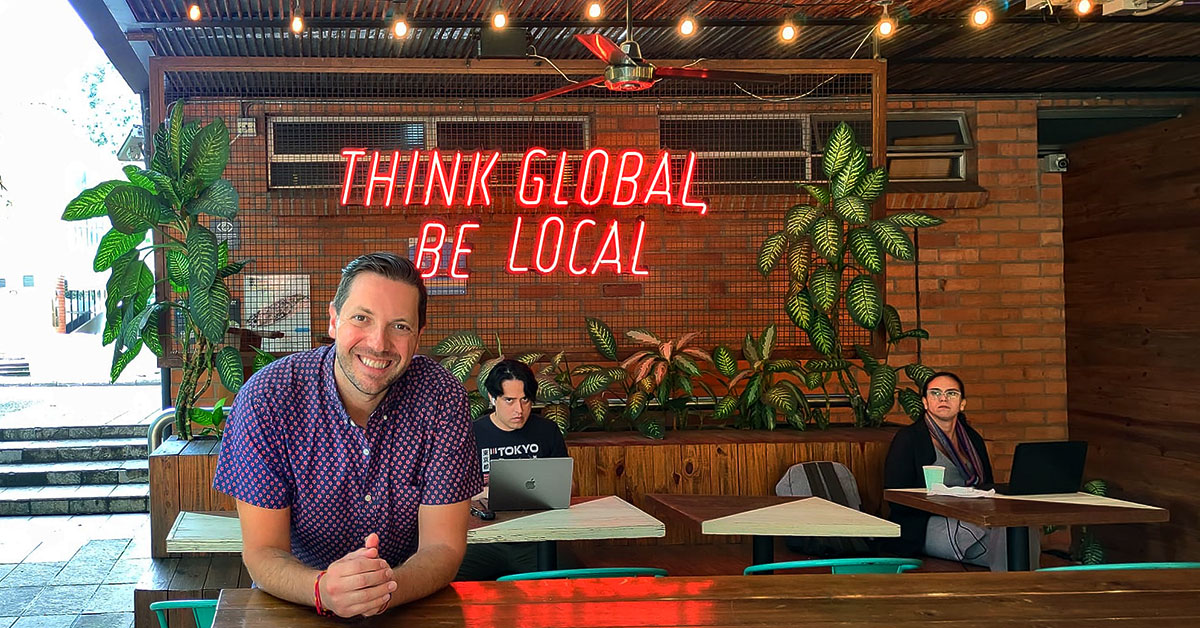Introducing Insights From My Travels Into JWU’s Curricula
Blog #3 – The Journey Concludes
By Dr. Bobby Gondola, Jr.
with Susanne Wissell and Nicholas Williams
Traveling from the Amazon to Medellin
Las Palabras: “If you do not ask, you don’t know what’s possible.”
Loosely translated from Spanish to English, the words, “El peor diligencia es lo que no se hace,” mean, “If you do not ask, you don’t know what’s possible.” These words — as well as their meaning — were shared by Eden Bolivar, the seasoned executive leader of Fulbright Colombia, during the journey from the Amazon to Medellin.
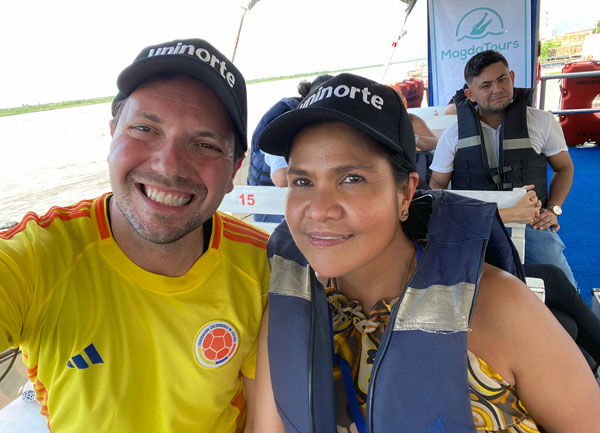
Eden offered this saying as a particular sentiment held by Colombians. “We engage with each other to ‘collaborar,’ or to collaborate,” she said. “You don’t show up at a counter and expect customer service; instead, you ask the person you are in front of to support you with help in solving a shared (or even individual) problem.”
As promoted by Fulbright, mutual exchange encourages greater accessibility to new ideas and ways to deepen partnership as well as understanding. The remainder of this incredible learning experience was filled with new knowledge, possibilities for future work, and immediate and emergent ways that Johnson & Wales students in the courses I teach might also benefit from the past four exceptional weeks.
New City, New Ideas: Medellin
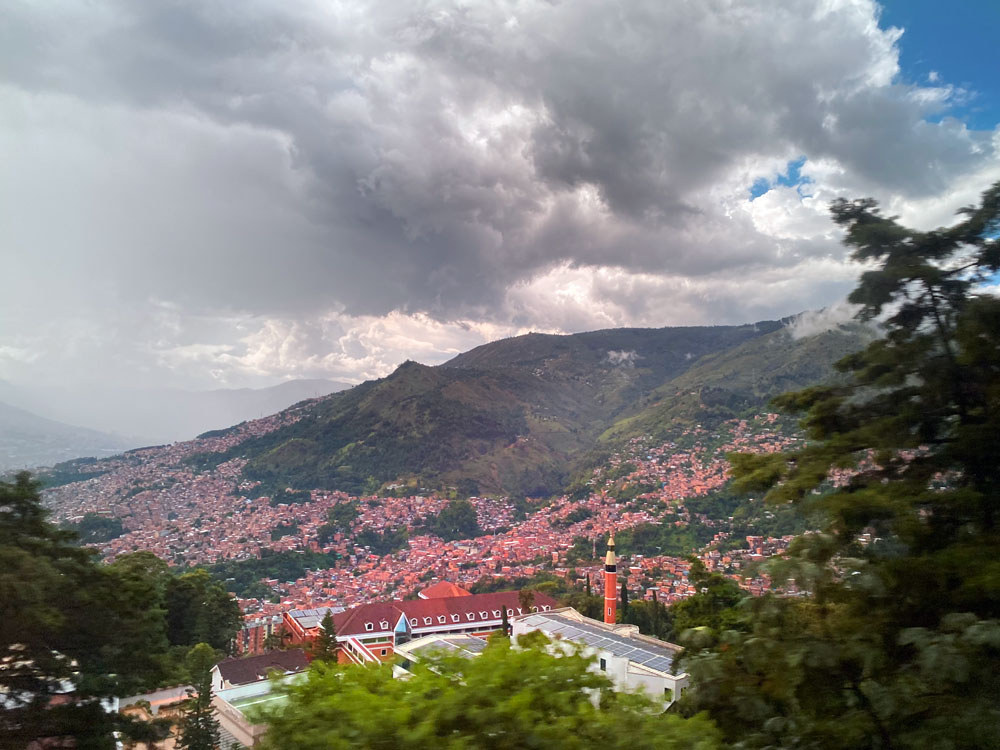
Medellin, in the mountains
While visiting with leaders at Universidad EAFIT, they shared with us how they were actively collaborating with employers. I became more familiar through research of workforce development in Colombia by understanding the bursary and employer pathway programs that were funded by the country’s largest employers.
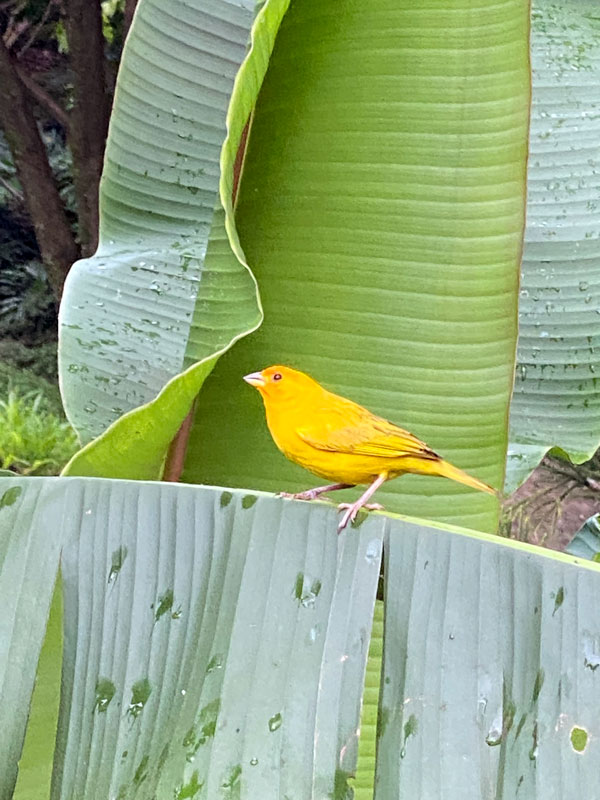
A methodology was also shared as we explored sustainable cities that anchored on four tenants: 1) efforts to infuse sustainability in city planning, 2) conservation of biodiversity, 3) advocating for public policy and decision making, and 4) conversation processes, which is particularly critical for Colombia, given 75% of the country lives in urban areas (as cited by Professor Natalia Catano Cardenas).
One of the University’s Trustees, Santiago Londono Uribe, shared his own personal story advancing from public service to professor to administrator. Professor Londono Uribe said, in politics, “There was no common ground — you either win and take everything or lose and get nothing. That’s not how it should be. Society’s important structural changes do not only come by winning elections. Structural changes take time and require consensus — and we forgot consensus. Politics is everywhere. But you don’t have to be in an eternal campaign.”
His words inspired the Fulbright scholars, who represent different disciplines, institutions and states. Professor London Uribe explained, “Looking to places where people who think differently from you and have different perspectives from you is how this work is done.”
His words further amplified the conception of collaboration and the role of institutions to support societal change. This lecture led to my own thoughts about my courses at Johnson & Wales. Nonprofit sustainability is often linked to funding, and while some may have deficit-minded perspectives on the lack of resources (Billups, 2024), my work as a fundraiser, at least in part for nearly two decades, has proven that funding is available to sustain nonprofits.
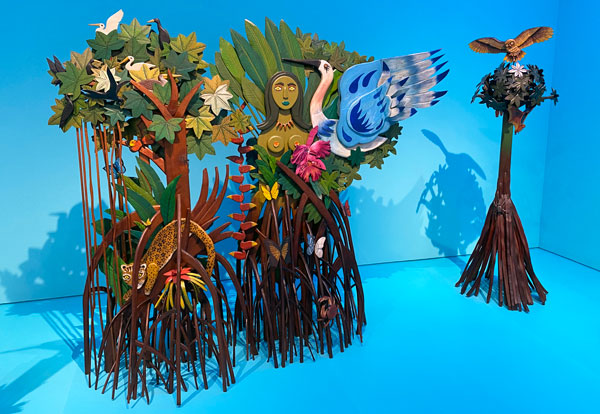
I was left to question, where are we directing the money? ‘Who are we working with in the community? What is the goal of investment and how is that impact best realized?’ I pondered these questions while visiting the beautiful Museo de Arte Moderno with installations that explored the city and its surrounding environment as well as a retrospective of Hernando Tejada’s sculpture, painting, and drawing.
I also imagined how these questions might be worked through (and answered) by students during my courses. For example, in Theory and Practice of Nonprofit Management (NPM5010), students dedicate a week to exploring resource development. My own experience provides examples for students familiarizing themselves with fundraising for nonprofits, and I can help extend their thinking about sustainability in nonprofits by providing examples of environmental sustainability.
Moravia, a Community of Power We Might Learn From
One example of investment in community though political, private, and non-governmental organizational (NGO) support is the “Community Tourism” efforts is in the neighborhood of Moravia, where politics and community organizing saw profound change in a community that was once a dumping ground and now home to vibrant community and environmental renewal.
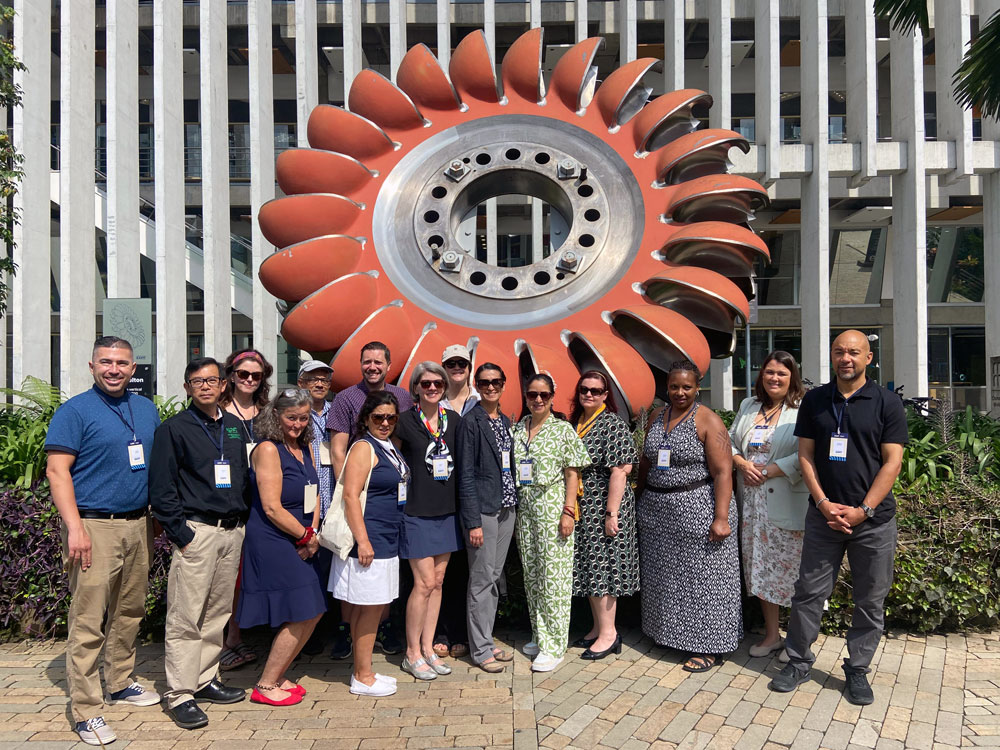
Scholars at the Rueda Pelton on EAFIT campus
The organizers at EAFIT wanted us to see examples of community rebirth, and they arranged for a meeting with local leaders of Moravia. I did not know what to expect; the community was once settled informally and was home to the surrounding city’s trash. Now, a former landfill is home to a vibrant artisan and laborer community within close proximity to the city of Medellin.
Our group visited a lovely cultural center and met with leaders, many of whom are women, who run the nonprofit organization. This organization helped preserve the history of Moravia and introduce their community-efforts to visitors.
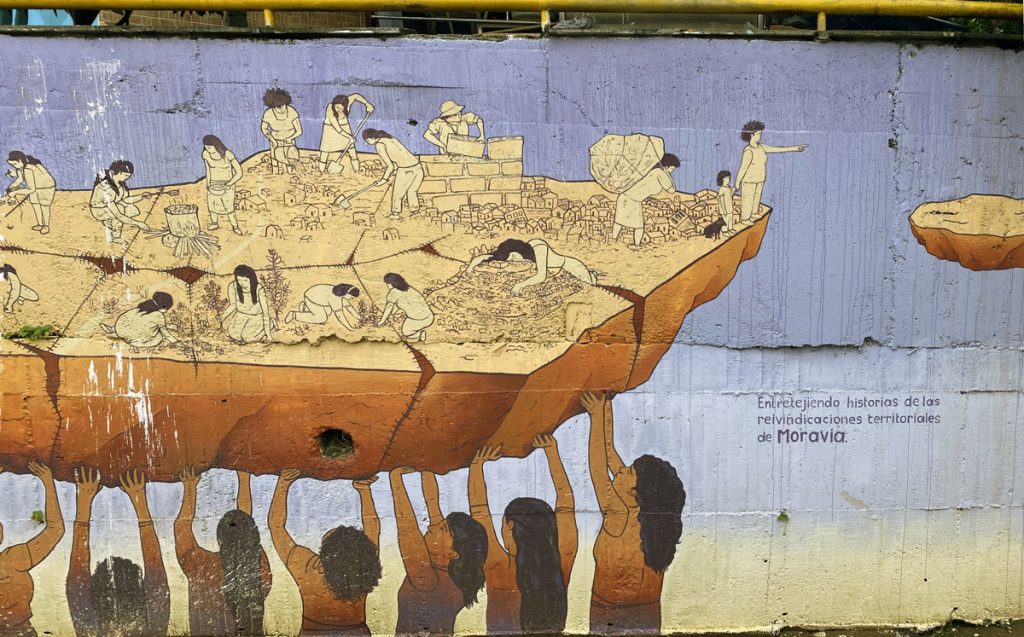
In my nonprofit management class, as well as my own experience of social entrepreneurship and personnel deployment in nonprofit organizations, students are introduced to organizations, including often-cited names like Goodwill, Red Cross, Salvation Army, and Special Olympics.
Through this experience, I was also introduced to much smaller community-based organizations that could be shared as examples of NGOs outside the United States nonprofit context, which will help my students and I think beyond the bounds of our borders.
In each class, there are also students that work for, or have interest in, faith-based and local community-based organizations, so having learned of additional organizations provides reference points that I can offer as examples when supporting students’ learning. These examples can be introduced when engaging with students through discussion posts or providing additional reading resources for supplementing context.
In Colombia, Moravia serves as an example of the effort for tourism revenues to remain in the community, and thus, social leaders have organized experiences for visitors to tour the city and meet with activists in the community center — filled with art, performance, history, and the neighborhood’s people. In my Intro to Nonprofit Management course, I plan to share the case example of this community to enhance students’ understanding of community-based tourism as a growing industry and provide an additional example of global efforts to sustain and grow communities.
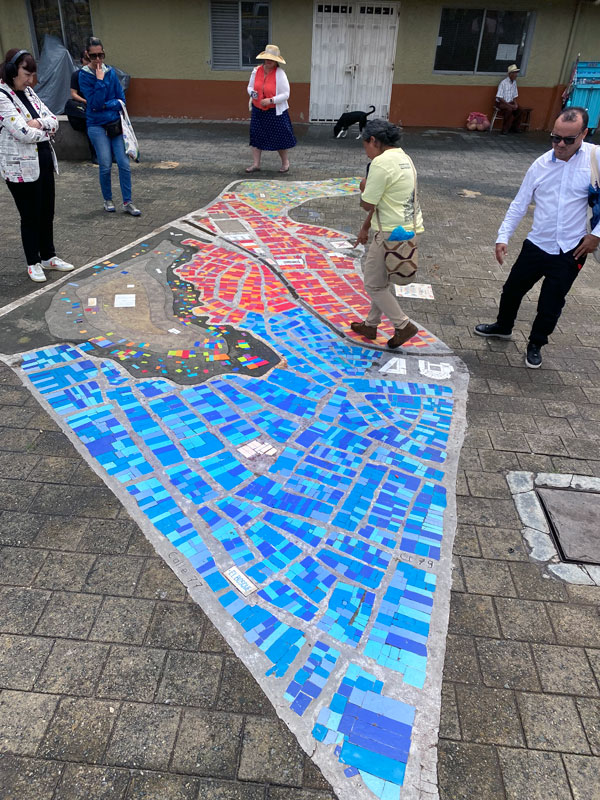
One of the women organizers, Monica Saldarriaga, Coordinator of the Moravia Cultural Development Center, questioned the group of scholars during our visit; she posed the question, “How do we as academics give back to the community and the communities we serve?”
I asked her, “What do you want us to share?” Monica answered, “I want to give you a photo so you can help take the story elsewhere.” This image of the community of Moravia was painted by her words as she described the bonds she has forged among the other women we were meeting with and the significance of their community; later, she showed us the tile mosaic map of the area.
Moravia provides many examples of community-based design in land, energy, and water use as well as its education, community, and social structures (Monterroza-Rios, A. D., et al., 2024). The visit demonstrated so much of the heart and pride of this community and their generosity to visitors who are on their own journeys.
Barranquilla & the Caribbean Coast: A Parallel to Rhode Island
Meisel at the Universidad del Norte, or “Uninorte.” The university maintains the coastal heritage of Colombia, and its significant role in the country’s origin story and its development, as well as its cultural processes. This history is documented through its MAPUKA museum collection from pre-Spanish through colonial times.
Founded with a vision to serve historically marginalized students of the region, Rector Director Meisel shared that, “Students are coming here for opportunity, and a majority of students at Uninorte are on scholarship.” The region once central to Colombian commerce as a historic port city and commerce hub has now moved elsewhere; therefore, the University has shifted its priority industry focus to services.
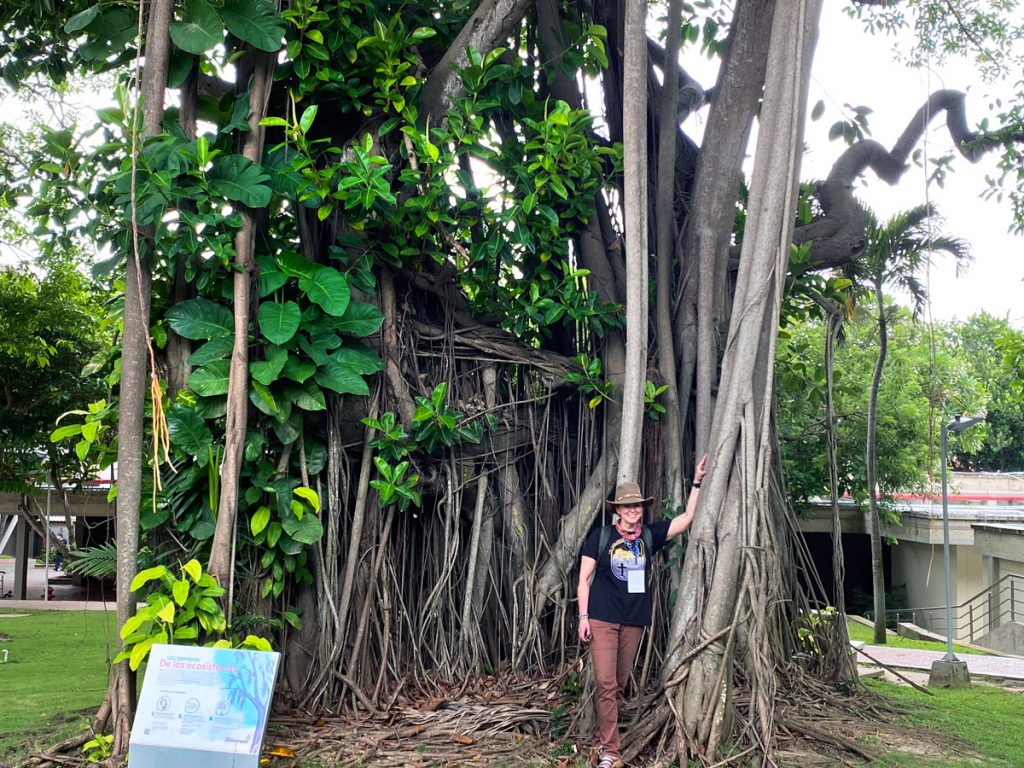
Trees on the Uninorte campus
Dr. María Cristina Martinez Habibe toured us around her campus, where we witnessed the beautifully preserved trees that were once part of the coastal jungle. The Dean of Sciences and a biologist, and a woman who loves the trees, Dr. Martinez emphatically underscored the awe-inspiring power of the trees. and the need for preserving these precious endangered plants. She would pull a leaf and describe its medicinal properties or break open a seed pod and share the tree’s secrets.
The story of the Colombian coast parallels Rhode Island’s once epicenter role in the American Industrial Revolution. Now, our university’s online programming at JWU Online supports new pathways of commerce and societal service in the northeast and across the United States.
In the online programs I teach in, we are preparing business students to enter global careers that are anchored in the principles of management and marketing with a special emphasis in nonprofit coursework — this emphasis helps students and graduates understand and apply the business of doing good and generating value to their future careers and volunteerism. This experience in Colombia challenged me to think how to support students in sustaining nonprofit missions to drive positive community and societal change.
Applications and Sharing Back Home
Since returning from my travels, I have also reconnected with Dr. Sofia Rivera, whom I met in Bogota and who completed her research in Barranquilla and along the Colombian Caribbean coast. She shared an academic paper she authored, and in it, Dr. Rivera argued for greater understanding of the elusive waterways. A critical home to coral and significant animal biodiversity – but also a place impacted greatly by climate change and growing fishing, transportation, and energy efforts – she referred to this dynamic as “separation” that is “overlooked,” leaving more research to be explored. Dr. Rivera’s paper is a piece of literature that I will share with my students at JWU, as they explore diverse examples that illustrate the concepts of mission, fund development, management, and organizational sustainability.
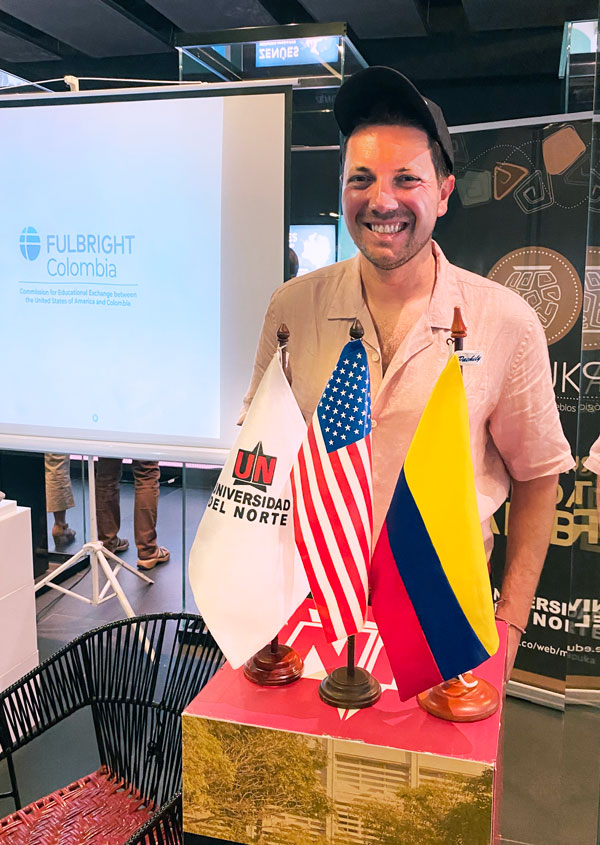
I recognize our university is increasingly recruiting students from communities, including Hispanic or Latinx students. In the classes I teach, I wish to increasingly provide worldly examples that reflect the rich diversity of the university students and the vast possibilities for the business, government, and nonprofit sectors ahead.
Fulbright coordinator and leader in the international studies department of the U.S. Department of Education, Mark Bladel asked, “How can we impact society and solve the world’s problems?” He answered his own question, “It’s through partnerships, friendships — they transcend academic systems in both the US and Colombia.”
Uninorte’s Alberto Roa Varelo, Vice Provost for Academics, added that this is through ‘travesuras’ or antics, and that playfulness helps one explore with curiosity and an eagerness to understand. It is certainly a practice I engaged in over the past month in Colombia, including at our very loud lunch table during our closing ceremony.
While the word ‘travesuras’ can take many meanings, I use the interpretation of “playful curiosity,” because it encapsulates the spirit of how I moved through the Fulbright journey this summer — as well as the energy I will bring to the courses I teach (and learn from) with JWU students.
In closing, Roa Varelo, who joined me and a social worker colleague, Dr. Sarah Moore from University of North Texas, during our last lunch, shared, “What is true is we live in a multicultural world and everyone must be prepared to work with each other. And my hope that we have built a connection here.” I responded, “This sentiment is shared by so many of us in Rhode Island, and I am eager to build relations and continue to conduct research in the workforce development and higher education space.”
Next Steps, And Until the Next Trip
As summer ends in this region, and the fall semester begins, I am excited to have returned to Rhode Island, better prepared to share my new awareness and knowledge — and to translate ‘travesuras’ into action that will inspire JWU students to learn and university colleagues to ‘collaborar.’
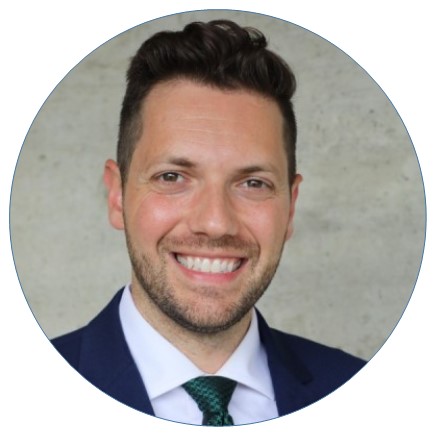
About Dr. Bobby Gondola, Jr.
Dr. Bobby Gondola Jr., Adjunct Professor in Johnson & Wales University’s (JWU) Master of Business Administration – Nonprofit Management degree program, is completing his second Fulbright Commission-sponsored research trip to Latin America during June-July 2024. As the only participant from New England, he joins 12 scholars from other higher education institutions throughout the United States for a month-long trip to Colombia.
Accompanied by faculty members at various universities in Colombia, Dr. Bobby and his colleagues will delve into the country’s incredibly rich biodiversity and environmental climate. The theme of the trip centers on environmental sustainability and energy, in large part due to over 70% of the electricity of Colombia being generated by hydroelectric means. To learn more about Dr. Bobby Gondola’s Fulbright Commission-sponsored research travels in Colombia, read his Blog #1 – Bogota and Blog #2 – Leticia and Amazonas.
